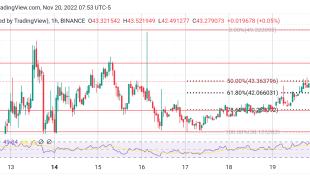Join Our Telegram channel to stay up to date on breaking news coverage
The bankruptcy of FTX has rocked the cryptocurrency market to its very core, yet traditional financial institutions are stepping into the world of digital currency. The Regulated Liability Network, a proof-of-concept digital currency network, was launched on Tuesday according to a collection of banking organizations that includes HBSC, Mastercard, and Wells Fargo (RLN).
The Federal Reserve and mainstream banking firms are collaborating to test a platform for digital currency.
The New York Innovation Center (NYIC), a division of the Federal Reserve Bank of New York, is thrilled to be collaborating with the members of the American banking and payments community on this [proof-of-concept] project, the group stated in a statement.
According to the consortium, the platform would make use of chances to enhance financial settlements by using distributed ledger technology, sometimes known as a blockchain. Central banks, commercial banks, and “regulated non-banks,” such as BNY Mellon, Citi, PNC Bank, Swift, TD Bank, Truist, and U.S. Bank, would all take part.
Whistleblower Edward Snowden, who is in exile, responded to the news by tweeting simply “It begins.”
Banking officials have long been interested in CBDCs, or central bank digital currencies. Similar to stablecoins, CBDCs are digital representations of a state’s fiat currency that are paired 1:1 with a particular fiat currency.
The RLN, according to the group, will exclusively accept U.S. dollars and run for twelve weeks. On a common blockchain, participants will issue fictitious digital tokens that represent consumer deposits and settle with fictitious central bank reserves.
According to the organization, the initiative would have a regulatory framework that is in line with current laws requiring know your customer (KYC) and anti-money laundering measures. The viability of expanding the platform to include additional digital assets like stablecoins will also be investigated. The organisation states that it will make the results of the pilot program public after the study is over, but adds that participants are not compelled to take part in subsequent projects.
The organization specifies that “this research will be undertaken in a test environment and will solely use simulated data.” It is not meant to advance any particular policy outcome or to suggest that the Federal Reserve will decide soon whether to issue a retail or wholesale CBDC or how one should be made, according to the Federal Reserve.
The creation of a national digital currency would not be the first endeavor of the United States. A digital yuen is already being developed in China. Australia advanced its pilot program for a digital dollar in September using Quorum, an enterprise-grade, private variant of Ethereum.
Related
- Thailand reveals new CBDC plans
- The ECB Considers Using CBDC To Prevent Market Dominance From BigTech
- Hong Kong unveils its retail CBDC with a unique design
Join Our Telegram channel to stay up to date on breaking news coverage


